*/
8134ac4c49244f51906d026ac8a211859cbc.jpg)
I have never been quite sure why television production companies have such a fascination with the law. For many of us involved in the legal profession, the ‘job’ involves hours of reading, waiting (there is a lot of waiting) and the tedium of drafting. The ‘drama’ is mostly juggling that work-life balance, finding a parking space near the court (in the days pre-COVID) and whether or not you’ll get paid.
But, that said, I have spent many hours (and more so over COVID) inhaling almost every legal fix that Amazon, Netflix and numerous digital channels could offer to me.
With that in mind I offer you, dear reader, the ultimate top ten of TV legal dramas. No films. No books and sadly no plays. So, what are the parameters? I don’t want to fall into the Die Hard Christmas trap (although, let’s be honest, it is a Christmas film). I have decided to select the programme on its best episodes (some dramas, like submissions, go on far too long). I have split my choices between the UK and US. I have also factored into the mix, its significance, to me, to culture and, dare I say, the profession. In preparing a top ten I have been forced to leave out so many wonderful TV legal dramas.
There is no place for The Split, for Better Call Saul, for Crown Court, or for Murder One. It is also incredible when looking back over many of these series for this article to see the number of now household actors who have cut their teeth in this genre. There was an episode of my ninth choice in 1974 which included both Harrison Ford and William Shatner.
So as any good DJ would (that’s disc jockey, not district judge), I shall start at number 10...
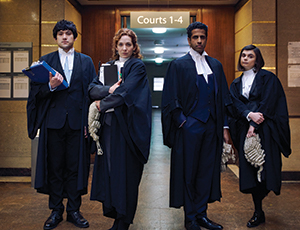
British, realistic and with a dark a sense of humour. We see how young barristers approach pupillage and imposter syndrome. How idealism falls to realism in a matter of weeks. That all criminals know more about the law than their lawyers. We have all been there. Haven’t we? A real find. A second season has been commissioned.
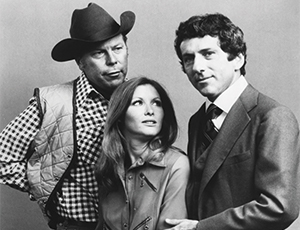
Barry Newman in the early 1970s played Tony Petrocelli, a Harvard educated attorney who gives up the glitz of the city, relocating to a sleepy town in Arizona. Over two seasons he defends those accused of murder, while casually building a house in the desert. Even in the 1970s here was a lawyer with an eye for detail, that go-to liberal passion and a brilliant trial lawyer. There is a wonderful moment near the end of every episode where our hero (the lawyer is always the hero, right?) recaps through cross-examination what really happened. Pure theatre, but then again, the ambition of every trial counsel.
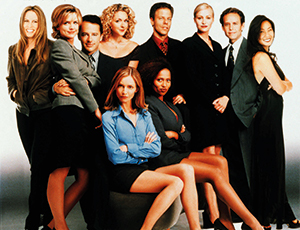
What we all want a law firm to be like. Sadly, they never are quite like this. From Barry White to dancing babies, it was hot, vibrant, funny, zany, stupid and delightful. You either fell in love with one of the characters (often Ally herself) or just wanted to be them. It was everything we hoped for in the profession. Wasn’t it? It was always amusing to watch John Cage’s collections of sneezes and creaky shoes to put off opponents in court. Highly inappropriate, mind you! This would never happen in the UK now, would it...
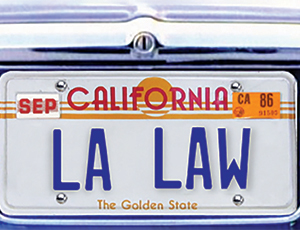
What a tremendous programme! Now somewhat dated, but for a time it was must-watch TV. California. A bunch of lawyers who cared basically for one thing and one thing only: money, money, money. While the programme may not have given lawyers a great name, it had it all: romance, in-fighting and the legendary Arnie Becker. Absolutely great fun.
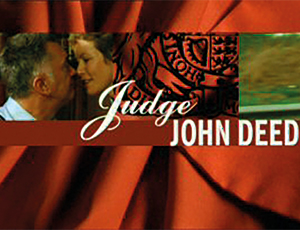
Martin Shaw plays the romanticised, liberal judge who basically breaks just about every rule going. He dates the barristers who appear before him; is at war with his fellow judges; and interferes with just about everything else while sitting in the High Court. So unrealistic, but it’s a good watch. It is one of those programmes where you just shout at the telly, ‘You can’t do that!’ ‘No. That’s not allowed.’ Very entertaining nonetheless.
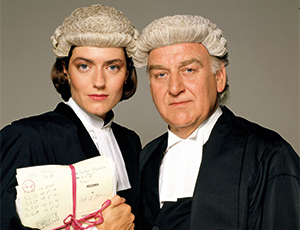
John Thaw is simply superb. What makes this programme work so well is that the writing is excellent. Each episode is based around a significant chunk of time in court. You see Kavanagh in action, plying his trade as a skilled advocate. Refreshing in that he doesn’t always win. There are also times when he does win and yet this, is the miscarriage of justice. The interactions with chambers are sometimes realistic, sometimes silly. My favourite moment is when the criminal hack, having undertaken an early parental alienation private law case, comes back into chambers after the hearing and begs to his clerk, ‘Tom, get me a burglary, get a me a good assault, get me a GBH, even a murder get me anything criminal, even if it’s drunk in charge of a bicycle but don’t get me a flaming family, aright.’ Welcome to my world!

Silk made, dare I say, barristers sexy. In Peter Moffat’s drama we had sex, politics and courtroom shenanigans. Maxine Peake was terrifying as a barrister on the make focused on becoming a silk. It was theatre, but lifelike. The image of the wig being stolen by the pupil from the London tailors must have made the Bar Standards Board shudder. In the character of Billy (played beautifully by Neil Stuke) we had the closest you will find to a proper old-school London clerk. Magical.
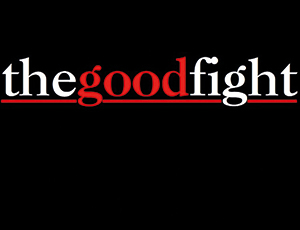
They say that sequels are never quite as good as the original. Yet this raises the bar with its legal political drama (the original being The Good Wife) played out in real time in the US during the presidency of Donald J Trump. Many of the episodes challenge his presidency and question the rule of law. The acting is first rate and allows you, the viewer, a real glimpse into the interaction between politics and the law. Something, perhaps until recently, something we have been less familiar with in the UK.
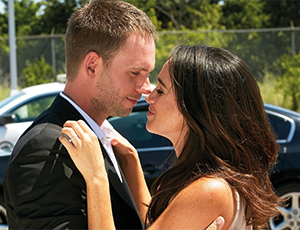
The TV show where we first met Meghan Markle. I shall make no further comment. We also, however, met Harvey Specter. The epitome of cool – he made all lawyers cool. Suave suits, good teeth and damn good looking. The bromance between him and law drop-out Mike Ross worked. It had less actual legal drama than many programmes, concentrating more on the ownership of the firm and keeping Mike’s secret secret; but it worked. I wonder where the cast are now.
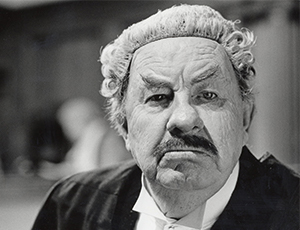
This may be considered a contentious choice, but then again, it is mine. That cantankerous, yet brilliant barrister has been an absolute inspiration. I was a child when I first saw him on television; challenging authority and following his path rather than that dictated to him. An approach which did not go down quite so well when I tried it at school, but we live and learn. Rumpole had it all: great trials; causes to fight for; an understanding (perhaps now dated) of society, ambition and life at the Bar (again, perhaps dated). It is still wonderful now for the Temple, its bars and indeed for its jobbing barrister, known affectionately by his surname: Rumpole.
Well, do you agree?
8134ac4c49244f51906d026ac8a211859cbc.jpg)
I have never been quite sure why television production companies have such a fascination with the law. For many of us involved in the legal profession, the ‘job’ involves hours of reading, waiting (there is a lot of waiting) and the tedium of drafting. The ‘drama’ is mostly juggling that work-life balance, finding a parking space near the court (in the days pre-COVID) and whether or not you’ll get paid.
But, that said, I have spent many hours (and more so over COVID) inhaling almost every legal fix that Amazon, Netflix and numerous digital channels could offer to me.
With that in mind I offer you, dear reader, the ultimate top ten of TV legal dramas. No films. No books and sadly no plays. So, what are the parameters? I don’t want to fall into the Die Hard Christmas trap (although, let’s be honest, it is a Christmas film). I have decided to select the programme on its best episodes (some dramas, like submissions, go on far too long). I have split my choices between the UK and US. I have also factored into the mix, its significance, to me, to culture and, dare I say, the profession. In preparing a top ten I have been forced to leave out so many wonderful TV legal dramas.
There is no place for The Split, for Better Call Saul, for Crown Court, or for Murder One. It is also incredible when looking back over many of these series for this article to see the number of now household actors who have cut their teeth in this genre. There was an episode of my ninth choice in 1974 which included both Harrison Ford and William Shatner.
So as any good DJ would (that’s disc jockey, not district judge), I shall start at number 10...

British, realistic and with a dark a sense of humour. We see how young barristers approach pupillage and imposter syndrome. How idealism falls to realism in a matter of weeks. That all criminals know more about the law than their lawyers. We have all been there. Haven’t we? A real find. A second season has been commissioned.

Barry Newman in the early 1970s played Tony Petrocelli, a Harvard educated attorney who gives up the glitz of the city, relocating to a sleepy town in Arizona. Over two seasons he defends those accused of murder, while casually building a house in the desert. Even in the 1970s here was a lawyer with an eye for detail, that go-to liberal passion and a brilliant trial lawyer. There is a wonderful moment near the end of every episode where our hero (the lawyer is always the hero, right?) recaps through cross-examination what really happened. Pure theatre, but then again, the ambition of every trial counsel.

What we all want a law firm to be like. Sadly, they never are quite like this. From Barry White to dancing babies, it was hot, vibrant, funny, zany, stupid and delightful. You either fell in love with one of the characters (often Ally herself) or just wanted to be them. It was everything we hoped for in the profession. Wasn’t it? It was always amusing to watch John Cage’s collections of sneezes and creaky shoes to put off opponents in court. Highly inappropriate, mind you! This would never happen in the UK now, would it...

What a tremendous programme! Now somewhat dated, but for a time it was must-watch TV. California. A bunch of lawyers who cared basically for one thing and one thing only: money, money, money. While the programme may not have given lawyers a great name, it had it all: romance, in-fighting and the legendary Arnie Becker. Absolutely great fun.

Martin Shaw plays the romanticised, liberal judge who basically breaks just about every rule going. He dates the barristers who appear before him; is at war with his fellow judges; and interferes with just about everything else while sitting in the High Court. So unrealistic, but it’s a good watch. It is one of those programmes where you just shout at the telly, ‘You can’t do that!’ ‘No. That’s not allowed.’ Very entertaining nonetheless.

John Thaw is simply superb. What makes this programme work so well is that the writing is excellent. Each episode is based around a significant chunk of time in court. You see Kavanagh in action, plying his trade as a skilled advocate. Refreshing in that he doesn’t always win. There are also times when he does win and yet this, is the miscarriage of justice. The interactions with chambers are sometimes realistic, sometimes silly. My favourite moment is when the criminal hack, having undertaken an early parental alienation private law case, comes back into chambers after the hearing and begs to his clerk, ‘Tom, get me a burglary, get a me a good assault, get me a GBH, even a murder get me anything criminal, even if it’s drunk in charge of a bicycle but don’t get me a flaming family, aright.’ Welcome to my world!

Silk made, dare I say, barristers sexy. In Peter Moffat’s drama we had sex, politics and courtroom shenanigans. Maxine Peake was terrifying as a barrister on the make focused on becoming a silk. It was theatre, but lifelike. The image of the wig being stolen by the pupil from the London tailors must have made the Bar Standards Board shudder. In the character of Billy (played beautifully by Neil Stuke) we had the closest you will find to a proper old-school London clerk. Magical.

They say that sequels are never quite as good as the original. Yet this raises the bar with its legal political drama (the original being The Good Wife) played out in real time in the US during the presidency of Donald J Trump. Many of the episodes challenge his presidency and question the rule of law. The acting is first rate and allows you, the viewer, a real glimpse into the interaction between politics and the law. Something, perhaps until recently, something we have been less familiar with in the UK.

The TV show where we first met Meghan Markle. I shall make no further comment. We also, however, met Harvey Specter. The epitome of cool – he made all lawyers cool. Suave suits, good teeth and damn good looking. The bromance between him and law drop-out Mike Ross worked. It had less actual legal drama than many programmes, concentrating more on the ownership of the firm and keeping Mike’s secret secret; but it worked. I wonder where the cast are now.

This may be considered a contentious choice, but then again, it is mine. That cantankerous, yet brilliant barrister has been an absolute inspiration. I was a child when I first saw him on television; challenging authority and following his path rather than that dictated to him. An approach which did not go down quite so well when I tried it at school, but we live and learn. Rumpole had it all: great trials; causes to fight for; an understanding (perhaps now dated) of society, ambition and life at the Bar (again, perhaps dated). It is still wonderful now for the Temple, its bars and indeed for its jobbing barrister, known affectionately by his surname: Rumpole.
Well, do you agree?


The Chair of the Bar sets out how the new government can restore the justice system
In the first of a new series, Louise Crush of Westgate Wealth considers the fundamental need for financial protection
Unlocking your aged debt to fund your tax in one easy step. By Philip N Bristow
Possibly, but many barristers are glad he did…
Mental health charity Mind BWW has received a £500 donation from drug, alcohol and DNA testing laboratory, AlphaBiolabs as part of its Giving Back campaign
The Institute of Neurotechnology & Law is thrilled to announce its inaugural essay competition
How to navigate open source evidence in an era of deepfakes. By Professor Yvonne McDermott Rees and Professor Alexa Koenig
Brie Stevens-Hoare KC and Lyndsey de Mestre KC take a look at the difficulties women encounter during the menopause, and offer some practical tips for individuals and chambers to make things easier
Sir Geoffrey Vos, Master of the Rolls and Head of Civil Justice since January 2021, is well known for his passion for access to justice and all things digital. Perhaps less widely known is the driven personality and wanderlust that lies behind this, as Anthony Inglese CB discovers
The Chair of the Bar sets out how the new government can restore the justice system
No-one should have to live in sub-standard accommodation, says Antony Hodari Solicitors. We are tackling the problem of bad housing with a two-pronged approach and act on behalf of tenants in both the civil and criminal courts